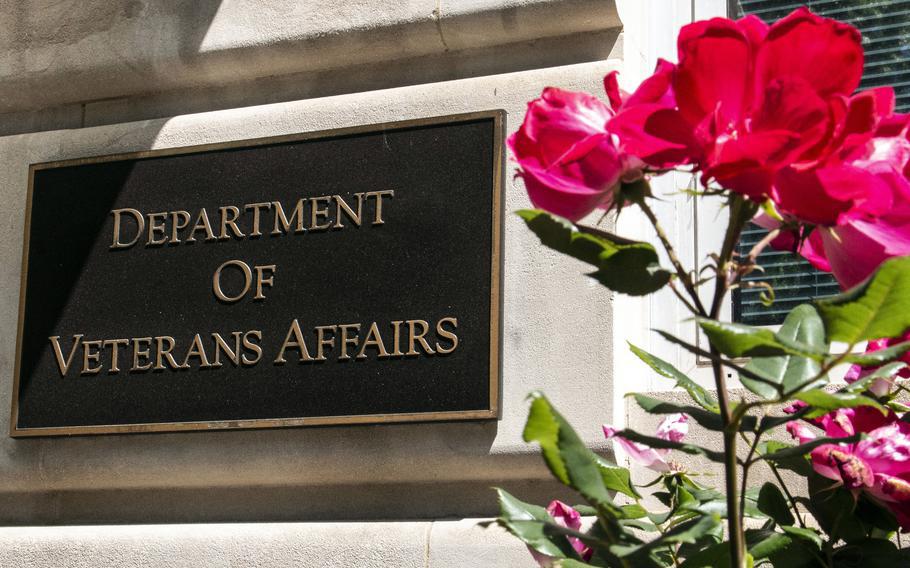
The Department of Veterans Affairs on Thursday, July 18, 2024, said Congress must move quickly to approve supplemental funding for the agency to close an estimated $15 billion spending gap through fiscal 2025 to avoid delays and cuts to veterans’ benefits and care. (Stars and Stripes)
WASHINGTON — The Department of Veterans Affairs on Thursday said Congress must move quickly to approve supplemental funding for the agency to close an estimated $15 billion spending gap through fiscal 2025 to avoid delays and cuts to veterans’ benefits and care.
Disability compensation and pension benefit payments to veterans scheduled to be delivered by Oct. 1 are “at risk of being delayed,” if the VA does not receive an estimated $3 billion to address a budget shortfall for the remainder of fiscal 2024, which ends Sept. 30, said Terrence Hayes, the VA press secretary.
He also said the VA might be forced to cut veterans services and care in fiscal 2025 if Congress does not agree to increase the agency’s $369 billion spending plan.
A $12 billion budget shortfall is projected next fiscal year without the additional funds.
“If the Veterans Health Administration does not receive additional funding, VA will continue to provide high-quality health care to veterans — but will make adjustments to remain within the current budget for fiscal year 2025,” Hayes said.
Demand for VA services exceeded expectations as a record number of veterans now seek VA services and benefits, he said. At the same time, the VA is reporting higher prices for prescription drugs and more hiring costs to fill critical vacancies at VA hospitals and clinics.
Democratic lawmakers from the House and Senate Veterans’ Affairs committees expressed support Thursday for providing the funds to cover the shortfall, while some Republican members criticized the VA for not anticipating higher spending needs.
“More veterans and their families are accessing their earned benefits than ever before, and they should not be shortchanged. This is a cost of war, and I will continue working to do right by each and every one of them,” said Sen. Jon Tester, D.-Mont., who is chairman of the Senate VA Committee.
But Rep. Mike Bost, R-Ill., chairman of the House VA Committee, accused VA Secretary Denis McDonough and other VA leaders of misleading lawmakers in testimony at budget hearings in the spring.
“This is not just fiscal mismanagement. It is strategic whiplash,” Bost said about the $15 billion shortfall through 2025.
Chief financial officers from the Veterans Benefits Administration and Veterans Health Administration apprised lawmakers this week of the anticipated budget shortfall and their expectations for additional funds, the VA said.
Rep. Mark Takano of California, the top Democrat on the House VA Committee, said he is encouraging fellow lawmakers to work with the VA to cover the shortfall and ensure benefits to veterans continue.
“Spending conversations for [fiscal 2025] are still very much ongoing, and there is time to address this like adults before the next fiscal year. We will need to have the hard, honest conversation of how we will pay for health care that veterans have earned,” he said.
But Takano said he continues to be concerned about rising costs for covering private health care for veterans who seek non-VA medical services in their communities.
Veterans are able to get treatment from private health care providers related to injuries and illnesses from military duty if the needed services are not readily available at VA facilities near their homes.
Takano warned a cost shift is underway to the private sector that risks reducing the quality of care at VA hospitals and clinics.
“I have been sounding the alarm for months about the push for privatization through community care, and how community care is more expensive and has far less oversight than direct VA care,” he said.
Hayes said the agency will not continue its recent pace of hiring at VA hospitals and clinics to meet veterans’ demand for more services following passage of the Sergeant First Class Heath Robinson Honoring our Promise to Address Comprehensive Toxics Act, or PACT Act.
The law provides medical care and monthly disability compensation to veterans diagnosed with diseases connected to toxic exposures from burn pits, radiation at weapons testing sites, and aerial spraying of Agent Orange and other herbicides.
Since the PACT Act became law, more than 710,000 veterans have enrolled in VA health care, Hayes said. Additional funds from Congress will enable the VA to fill vacancies and new positions in critical areas, he said.
“VA will continue to strategically hire in several key areas, such as mental health care and at targeted locations — such as locations with ongoing increases in health care enrollees,” Hayes said.
The VA does not have a hiring freeze, he said. However, some VA nurses held a rally in Washington last month to protest what they described as a national shortage of nurses at VA hospitals and clinics.
“The VA is working closely with Congress and the White House Office of Management and Budget to resolve these potential shortfalls in a way that prevents any adverse impacts on veterans and allows us to continue to deliver care and benefits to veterans at record rates,” Hayes said.